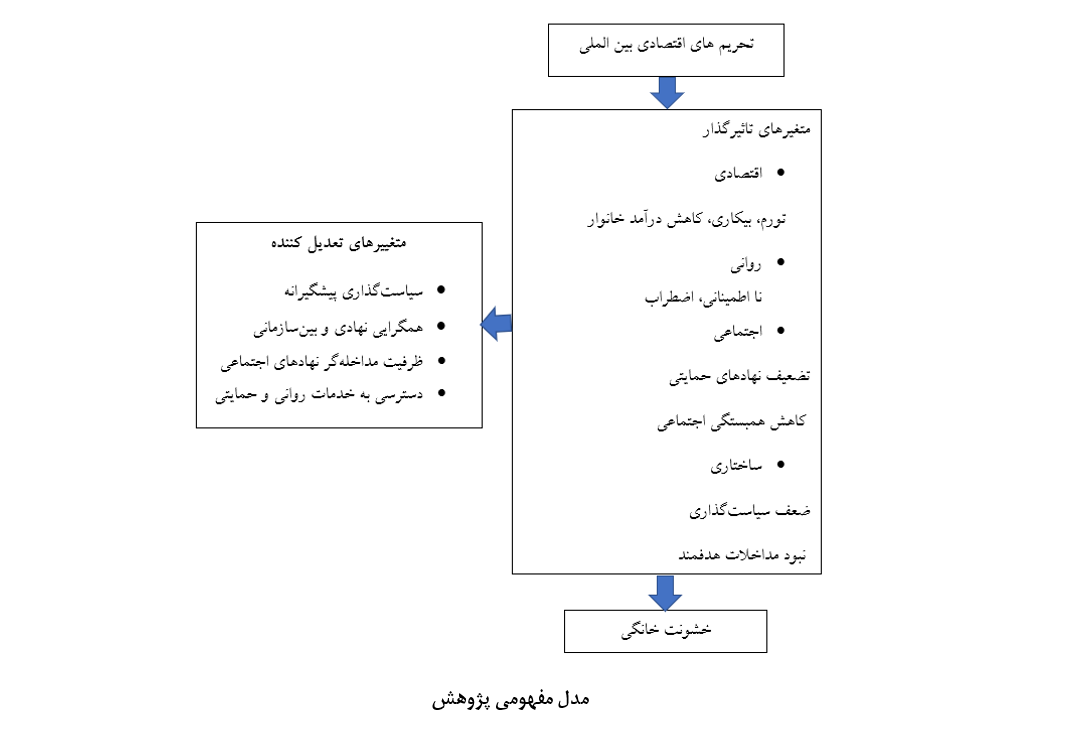Economic Sanctions and Human Security in Iran: A Strategic Analysis of Social and Psychological Consequences under International Pressure
Keywords:
Economic sanctions, human security, domestic violence, social consequences, women, psychological stress, supportive policiesAbstract
This study aims to strategically examine the impact of economic sanctions on human security in Iran by focusing on the escalation of domestic violence and its association with economic and social variables during international pressure. Using a mixed inductive–deductive approach, the research employed in-depth and semi-structured interviews with social science experts conducted in 2022. Data were analyzed using the grounded theory (Glaser model). To ensure validity and reliability, qualitative research standards such as confirmability, traceability, and dependability were applied. Participants were selected through purposive sampling, and interviews continued until theoretical saturation was achieved. The findings revealed that economic sanctions, through increasing unemployment, reducing household income, rising inflation, and weakening support policies, have significantly contributed to the rise of domestic violence against women. Economic and psychological pressures diminished family resilience and promoted aggressive behaviors within households. Moreover, the lack of coordination among policymaking institutions and the inefficiency of social welfare systems were key factors sustaining domestic violence during the sanction period. Sanctions have undermined not only national economies but also human security, social cohesion, and mental well-being. Addressing this crisis requires multilevel policymaking, including strengthening social protection mechanisms, promoting preventive interventions, and enhancing psychological and economic resilience of families. A community-centered and equity-oriented policy approach can reduce the human costs of sanctions and safeguard human security under international pressure.
Downloads
References
Abbasi Mouslou K, editor Investigating the Effects of Economic Sanctions on Community Health2019.
Abdollahi MR, Abolhasan Shirazi H. Direct Impact of Sanctions on Health, Physical, and Mental Well-being. 2021.
Tohidlou S. The Effects of Sanctions from the Viewpoint of Economic Sociologists. 2018.
Fadaei M, Derakhshan M. Analysis of the Short-Run and Long-Run Effects of Economic Sanctions on Economic Growth in Iran. 2014.
Kazerouni SA, Asgharpour H, Khezri O. Investigating the Effect of Economic Sanctions on the Composition of Iran's Major Trading Partners During the 1992-2013 Period. 2016.
Sadeghi R, Vizheh M, Zanjari N. Factors Related to Domestic Violence Against Women in Tehran. 2019.
Sharbatian MH, Danesh P, Tavafi P. Sociological Analysis of Domestic Violence Against Women and its Relationship with the Feeling of Security at Home (Case Study of Women Aged 18-54 in Miyaneh City). 2017.
Masoumeh H. Domestic Violence Against Pregnant Women: Prevalence and Related Causes. 2010.
Aghabeigouli A, Aghakhani K. Investigating the Phenomenon of Spouse Abuse in Tehran City in 2000. 2007.
Fekri SD, Khoshnevis N, Zareiyan A, Kheirkhahi E, Moghadam ZB, Namazi M. Breaking the Silence: Barriers to Help-Seeking Among Female Victims of Domestic Violence in Ardabil, Iran – A Qualitative Study. Plos One. 2025;20(7):e0326998. doi: 10.1371/journal.pone.0326998.
Kim JY, Oh S, Nam SI. The incidence and impact of family violence on mental health among South Korean women. Korean Journal of Social Welfare. 2009;24:193-202. doi: 10.1007/s10896-008-9220-5.
Vander Ende KE, Sibley LM, Cheong YF, Naved RT, Yount KM. Community economic status and intimate partner violence against women in Bangladesh: Compositional or contextual effects? Violence Against Women. 2015;21(6):679-99. doi: 10.1177/1077801215576938.
Kelmendi K. Domestic violence against women in Kosovo: A qualitative study of women's experiences. Journal of Interpersonal Violence. 2015;30(4):680-702. doi: 10.1177/0886260514535255.
Kunasagran PD, Mokti K, Ibrahim MY, Syed Sharizman Syed Abdul R, Robinson F, Muyou AJ, et al. The Global Landscape of Domestic Violence Against Women During the COVID-19 Pandemic: A Narrative Review. Korean Journal of Family Medicine. 2024;45(1):3-11. doi: 10.4082/kjfm.23.0084.
Asha AA. Inclusive Justice and Sustainable Legal Protections Against Domestic Violence: A Comparative Study of UK, Canada, and Australia. Jier. 2025;5(2). doi: 10.52783/jier.v5i2.2465.
Edmunds M, Patroni J, Olorunnisola TS. Family and Domestic Violence in Australia: What Is Missing and What Do We Know? A Scoping Literature Review. Trauma, Violence, & Abuse. 2025;15248380251343188.
Mohammadkhani P, Rezaei Dougah E, Mohammadi MR, Azadmehr H. Prevalence of Domestic Violence Patterns, Committing or Experiencing it in Men and Women. 2013.
Reed SM, Kibler MA, Avalos S. “. . .It’s Just the Barriers That Can Be So Vast and Different”: Domestic Violence Advocates’ Perceived Barriers for Service Across Survivor Subpopulations. Crime & Delinquency. 2024;70(13-14):3582-606. doi: 10.1177/00111287241248090.
Shorey S, Baladram S. "Does It Really Get Better After Dad Leaves?" Children's Experiences with Domestic Violence: A Qualitative Systematic Review. Trauma, Violence, & Abuse. 2024;25(1):542-59. doi: 10.1177/15248380231156197.
Sultana R, Husain N, Allen O, Taylor P. Barriers and Facilitators for Help-Seeking Behaviors in British South Asian Women Who Have Experienced Domestic Violence: A Qualitative Study. Families in Society the Journal of Contemporary Social Services. 2024. doi: 10.1177/10443894241272176.
Kobrlo NAMD. Domestic Violence in Iraqi Society Between Acceptance and Rejection in the Media. Route Educational and Social Science Journal. 2024. doi: 10.17121/ressjournal.3551.
Mordas ES. Domestic Violence and Maternal Perversion. Психолог. 2024(4):28-44. doi: 10.25136/2409-8701.2024.4.69150.
Mirzaei K. Qualitative Research: Research, Researchers, and Research Paper Writing (Keyfipajouhi: Pajouhesh, Pajouheshgari va Pajouheshnameh-nevisi)2016.
Yahyizadeh H. Social Work Intervention in Domestic Violence Against Women: A Guide: Ava-e Noor Publications; 2024.

Downloads
Published
Submitted
Revised
Accepted
Issue
Section
License
Copyright (c) 2025 Hossein Nazarifar (Author); Khalil Mirzaei (Corresponding author); Roghieh Bahari (Author)

This work is licensed under a Creative Commons Attribution-NonCommercial 4.0 International License.










